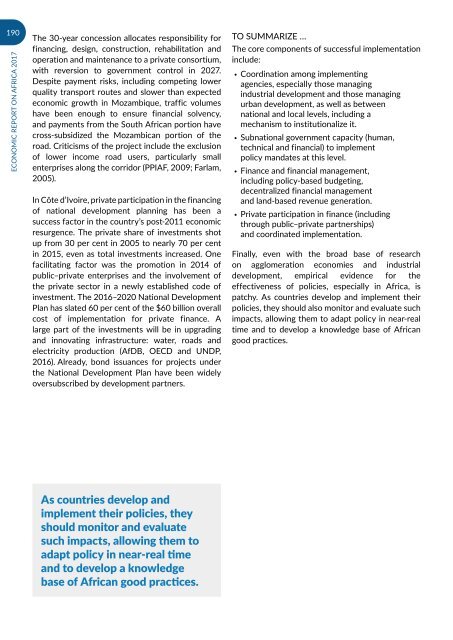URBANIZATION AND INDUSTRIALIZATION
Economic%20Report%20on%20Africa%202017%20UNECA
Economic%20Report%20on%20Africa%202017%20UNECA
You also want an ePaper? Increase the reach of your titles
YUMPU automatically turns print PDFs into web optimized ePapers that Google loves.
190<br />
ECONOMIC REPORT ON AFRICA 2017<br />
The 30-year concession allocates responsibility for<br />
financing, design, construction, rehabilitation and<br />
operation and maintenance to a private consortium,<br />
with reversion to government control in 2027.<br />
Despite payment risks, including competing lower<br />
quality transport routes and slower than expected<br />
economic growth in Mozambique, traffic volumes<br />
have been enough to ensure financial solvency,<br />
and payments from the South African portion have<br />
cross-subsidized the Mozambican portion of the<br />
road. Criticisms of the project include the exclusion<br />
of lower income road users, particularly small<br />
enterprises along the corridor (PPIAF, 2009; Farlam,<br />
2005).<br />
In Côte d’Ivoire, private participation in the financing<br />
of national development planning has been a<br />
success factor in the country’s post-2011 economic<br />
resurgence. The private share of investments shot<br />
up from 30 per cent in 2005 to nearly 70 per cent<br />
in 2015, even as total investments increased. One<br />
facilitating factor was the promotion in 2014 of<br />
public–private enterprises and the involvement of<br />
the private sector in a newly established code of<br />
investment. The 2016–2020 National Development<br />
Plan has slated 60 per cent of the $60 billion overall<br />
cost of implementation for private finance. A<br />
large part of the investments will be in upgrading<br />
and innovating infrastructure: water, roads and<br />
electricity production (AfDB, OECD and UNDP,<br />
2016). Already, bond issuances for projects under<br />
the National Development Plan have been widely<br />
oversubscribed by development partners.<br />
TO SUMMARIZE …<br />
The core components of successful implementation<br />
include:<br />
ҋҋ<br />
Coordination among implementing<br />
agencies, especially those managing<br />
industrial development and those managing<br />
urban development, as well as between<br />
national and local levels, including a<br />
mechanism to institutionalize it.<br />
ҋҋ<br />
Subnational government capacity (human,<br />
technical and financial) to implement<br />
policy mandates at this level.<br />
ҋҋ<br />
Finance and financial management,<br />
including policy-based budgeting,<br />
decentralized financial management<br />
and land-based revenue generation.<br />
ҋҋ<br />
Private participation in finance (including<br />
through public–private partnerships)<br />
and coordinated implementation.<br />
Finally, even with the broad base of research<br />
on agglomeration economies and industrial<br />
development, empirical evidence for the<br />
effectiveness of policies, especially in Africa, is<br />
patchy. As countries develop and implement their<br />
policies, they should also monitor and evaluate such<br />
impacts, allowing them to adapt policy in near-real<br />
time and to develop a knowledge base of African<br />
good practices.<br />
As countries develop and<br />
implement their policies, they<br />
should monitor and evaluate<br />
such impacts, allowing them to<br />
adapt policy in near-real time<br />
and to develop a knowledge<br />
base of African good practices.


